Interview with Ewa Justka of Heretic Machines: DIY Synths, Freedom of Expression and the Future of Electronic Music
I’ve been following Ewa Justka aka Mistyping Technician on Substack for awhile now. She’s a synth builder and electronic musician based out of Northern Italy b/w of UK and Poland. She has been an outspoken critic of gender ideology and has faced censorship as a result, so I wanted to get her on the blog to share her experiences and promote her electronic instruments. She makes some really cool electronic instruments that I think will be of interest to many of you. Enjoy the interview and consider supporting her work.
1. What inspired you to start building synthesizers. Did it stem from an interest in electronic music, or did the tech lead you to electronic music?
Hey :) Thanks so much for inviting me to participate in this interview! I really appreciate it.
It all started with my interest in electronic music. When I was a goth teenager I was really into industrial, noise, and power electronics. When I moved to London around 2009, I started attending DIY synth-making workshops, which I found through the noise scene. That’s how I got hooked—I kept building, and it actually became a form of therapy for me. Making synths keeps my attention and it’s weirdly relaxing. I also couldn’t afford a proper synth at the time, so I did my first gigs using my own crude DIY builds. They looked very DIY—housed in Tupperware, jars, or even just bare copper boards with no enclosure at all! They were basic: mostly square wave oscillators with light-dependent resistors.
2. Can you walk us through your design process when creating a new synth?
Sure! It all depends on the timeline. These days, I look at the market and think about what’s missing—what can I add that hasn’t been done to death? The truth is, the market is oversaturated with synthesizers from both independent makers and companies, many designed by far more skilled engineers than me (in fact, I’m not even an engineer – I’m self-taught). I don’t do much programming—only very basic Arduino stuff. In fact, it would make far more sense to design fully digital modules because their design takes less space and gives you more options for complex synthesis. But I still prefer analogue oscillators and effects because they’re more unstable and unpredictable. I have a particular obsession with delay-based effects, especially flangers. Sure, you can replicate them digitally, but nothing compares to an analogue BBD (Bucket Brigade Device) flanger. The BBD chip was invented in 1969, fell out of production, and has only recently made a comeback. Generally, I think that, design process is more or less about combining different schematics and deciding which features work best together. The biggest challenge is creating an interesting and functional user interface. Because I started as a musician, I design modules based on the kinds of patches and synthesis techniques I enjoy—cross-modulations, heavy feedback, distortions, and chaotic/random elements. Some of my biggest inspirations are Nonlinear Circuits, Jürgen Haible, and Rob Hordijk. I also love Thomas Henry’s designs—his books on synthesis and audio electronics are a must-read for anyone interested in getting into serious synth design territory.
3. What do you think are the most important features or characteristics that make a synth unique or stand out?
For me, the user interface is crucial—panel design, types of knobs and switches, PCB layout, and maybe some touch points for modulation. There are some amazing designers out there. Gijs Gieskes incorporates mechanical parts into synths. LZX Industries makes incredible audio-visual modules. And then there’s XAOC Devices, a company based in Warsaw—one of the most advanced Eurorack manufacturers, in my opinion. Their modules are mostly digital, allowing for greater precision and more complex synthesis techniques (such as advanced FM synthesis and multi-oscillators). That level of complexity is literally impossible to achieve using analogue circuitry. That said, I also love simple instruments—like Behringer’s TR-09, a cheap digital clone of the Roland TR-909. I love drum machines with straightforward sequencers and controls. I’m definitely more of a 909 kick person than an 808—I just really enjoy heavy, thick kick drums. I used to be really into Roland’s designs. I had an MC-202, which I had to sell (RIP), but I still have a JP-8080—that classic purple monster. Without it, there would be no trance music! It’s insane how much influence that synth had on the development of that genre. The same goes for the TB-303 and acid techno. Sorry, I’m going on a rant!
4. How do you balance the technical specifications with the user experience when designing a new synthesizer?
That’s always the hardest part! My biggest problem is self-restriction—I always want to cram too many features into one module. It takes a lot of trial and error (and failed designs) to get better at that.
5. You’ve been outspoken on Notes on some of the negative experiences you’ve had with the woke mob. Do you want to share some of those experiences with the BM readers?
Hooo boy. Yeah. It was mental. I used to live in the UK—moved from London to Scotland to start a PhD in Edinburgh, which I later dropped because it was a waste of time (also, I was broke and stressed from juggling work and studies). Scotland is unbelievably woke, especially Glasgow, where I worked. If you’re in the arts or electronic music scene, you either stay silent and obedient, or you’re out. One wrong joke, one wrong meme posted when perhaps slightly drunk, and you’re done. The language policing and virtue signalling are insane. Long story short: I posted a documentary called Why the Left Hates TERFs on my Instagram story. That was enough to get me banned from leading a synth workshop—because I was supposed to run it with a man who thinks he’s a woman. Then more gigs were cancelled (with more men with identity issues—they really do dominate electronic music, and many powerful men who run these venues and art organisations are either AGPs themselves or have someone in their family or in their “friend” group who is one). After the first cancellation, I made an online post criticising gender ideology even more openly (my anti-authoritarian nature!) because I was pissed off—so the rest of the gigs and workshops, including one organised by a “feminist” organisation named after Daphne Oram (the British female instrument inventor), were also cancelled. They should honestly rename their organisation after Wendy Carlos, seriously. People I’d known for years stopped talking to me. I was called a Nazi, a fascist, a transphobe. One time, I wasn’t even served a beer in a Glasgow bar because the soyboy bartender ‘felt unsafe’ (this was a guy I had literally gotten a job for). At this point, I don’t get festival invitations anymore. Sometimes I get an email, but when they findout I’ve criticised gender ideology, they ghost me. And honestly? Fine. I don’t want to be part of a scene that forces people to worship this deranged ideology and polices language, self-expression, and sense of humour. And most of all, it’s absolutely inhuman to its core. I could go on about how many “women in music” orgs focus on identity politics while being unable to define what a woman is, but I’ll stop here.
6. From a technical stand point what are some of the challenges you might face when designing and building a synth?
The biggest issue isn’t even technical—it’s promotion. I’ve been banned from multiple synth shops (including a major one in Brighton, UK) just because I’m a TERF. And since my partner is associated with me, his instruments are banned from that store too. Marketing is tough. You have to reach out to "synthfluencers," and they charge insane fees—some ask for thousands of euros just to promote your synth. I can’t afford that. Then there’s the woke factor. If you want to succeed in the synth world, you either keep quiet or slap a slogan like "This Synth Kills Fascists!" on your instruments—so much virtue-signalling nonsense. I recently saw a post by some guy claiming his synth is eco-friendly. Fucking hell. Seriously? Synth fairs like Superbooth (Berlin) are also ridiculously expensive to sell/promote your instruemnts at—not to mention woke as hell (like pretty much every electronic music event these days). Booking a table costs around 1,000 euros, and the whole thing is a hipster-fest full of synthfluencers and bloggers. Just thinking about it makes me anxious. Can’t do it!
7. How do you see the future of synthesizer technology evolving? Do you envision a future where software synths have taken over completely, or do you think that there will always be a demand for hardware synths?
Honestly, it depends on trends. Right now, digital-analog hybrids are popular. But I personally love vintage tech—nixie tubes, neon bulbs, valves, CRTs...I built a neon bulb synthesiser some time ago— so much fun! There’s even a company called Metasonix that makes insane valve-based synths (their drummachine is incredible, but super expensive). They used to be anti-PC and hilarious—one of their synths was literally called "CUNT DESTROYER" (back when humour was allowed). Unfortunately, synth trends are dictated by synth influencers—like everything else in this broken culture.
8. What kind of feedback or requests from users have most influenced the development of your products?
To be honest, the only person who gives me feedback is my partner—who also designs synths.
9. What advice would you give to someone interested in starting to build their own synthesizers?
Start with workshops! There are also great YouTube channels and books—Nicolas Collins ’Handmade Electronic Music is a great intro. If anyone wants PDFs, feel free to contact me!
10. To close out, feel free to drop any links where people can contact you or purchase your synths.


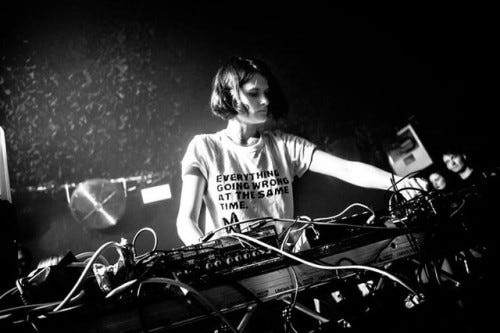
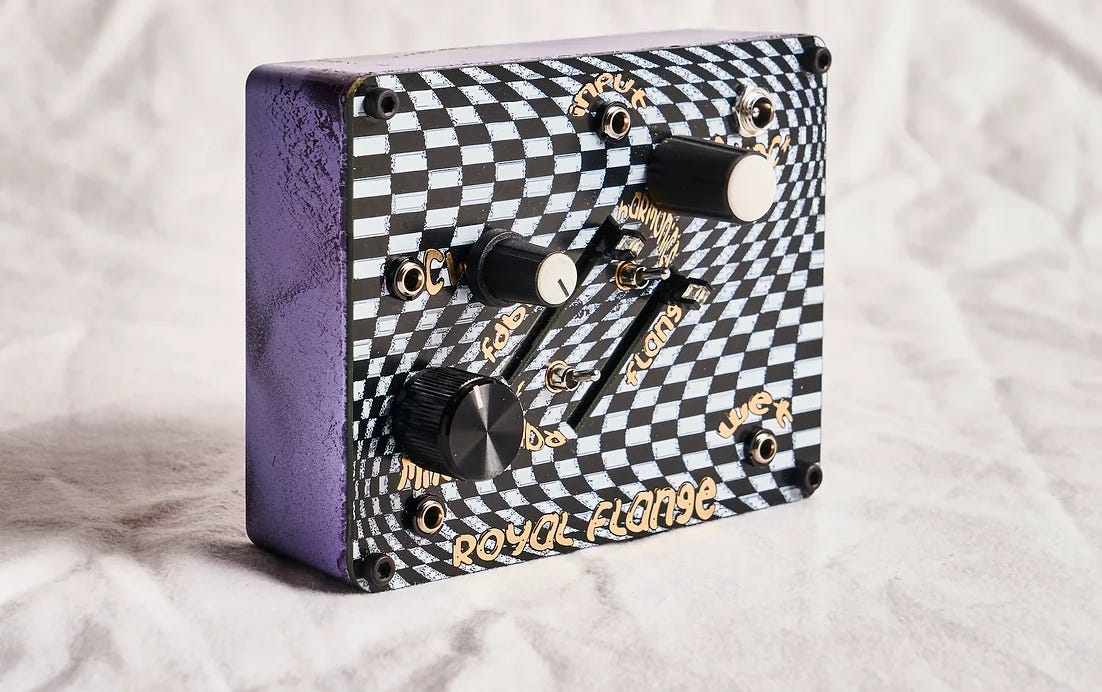
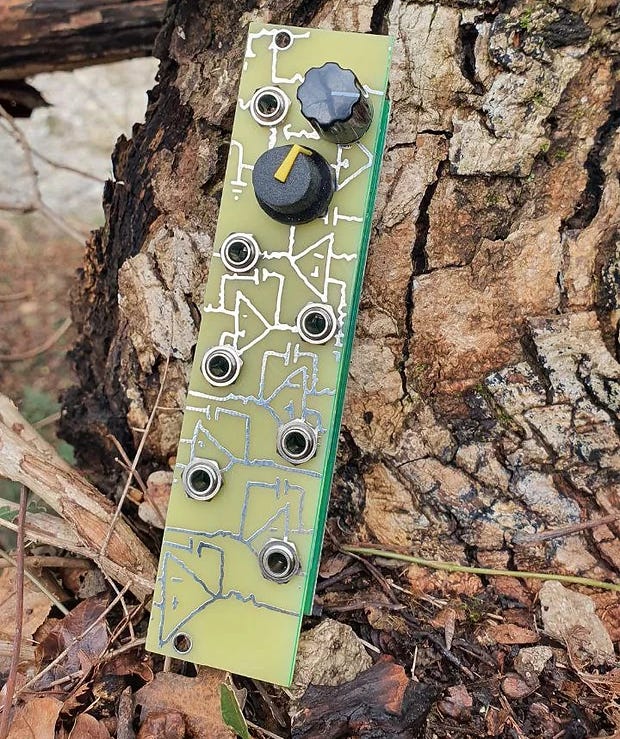
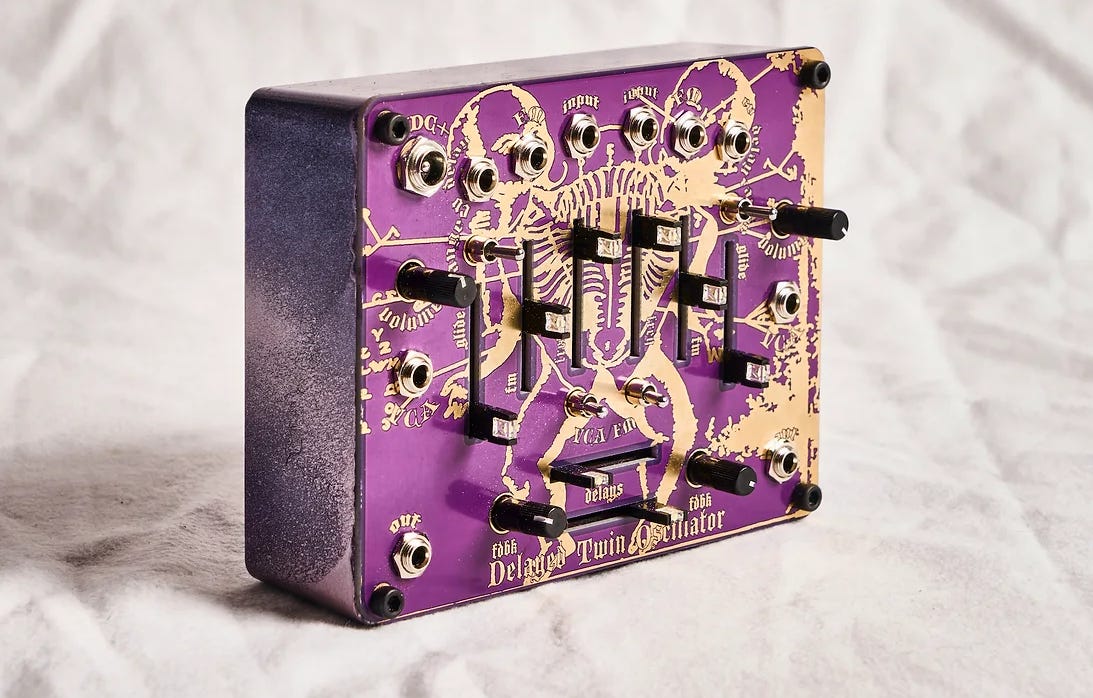
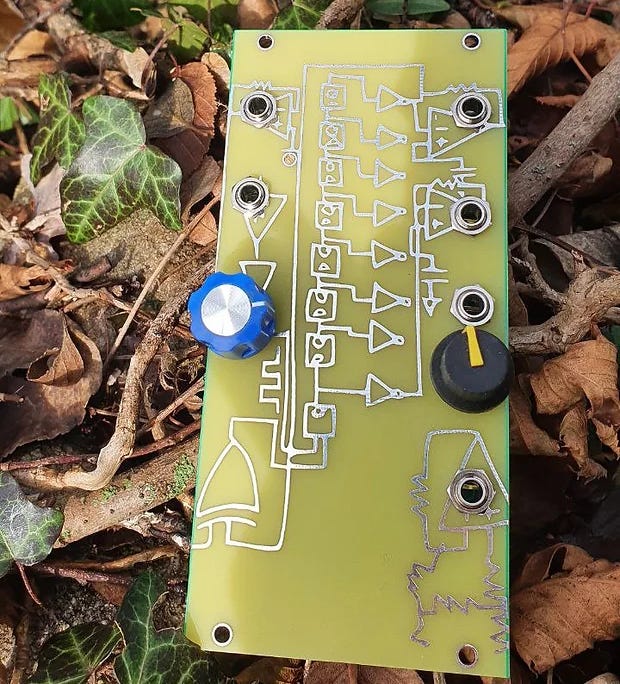
Ewa makes great stuff, one downside of soft synths is the never ending “upgrade” and OS compatibility cycle, a real time waster….hardware on the other hand just works when you turn it on.
Thanks for posting. I’ve been in the underground music scene for most of my life. I’ve become completely disillusioned with it since the scamdemic. A wake up call for sure. Interested in artists who aren’t pathetic fags.